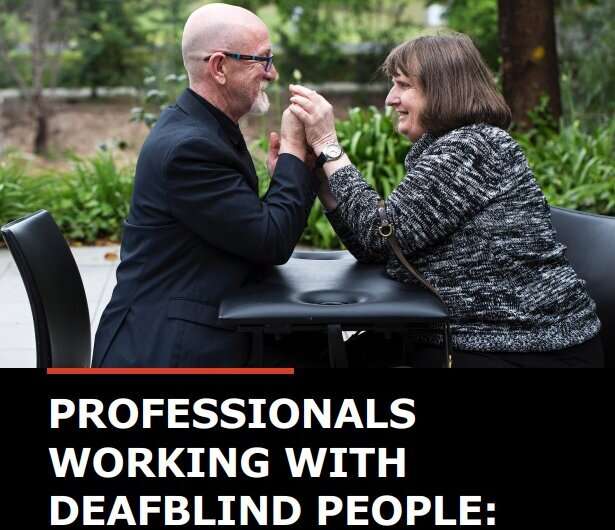This article has been reviewed according to Science X's editorial process and policies. Editors have highlighted the following attributes while ensuring the content's credibility:
fact-checked
trusted source
proofread
Global survey reveals challenges faced by professionals supporting deafblind individuals

Ahead of Deafblind Awareness Week, a global survey from Monash University reveals the challenges and opportunities to supporting deafblind individuals.
In collaboration with Able Australia and the National Accreditation Authority for Translators and Interpreters (NAATI), researchers from the Faculty of Arts at Monash University have conducted a global survey on the experiences and perspectives of professionals who provide support services to deafblind individuals.
The survey, which received responses from 324 professionals across 36 countries, examined the roles and educational backgrounds of interpreters, support workers, and other professionals engaged in providing support services to deafblind individuals. The results shed light on the challenges faced by these professionals and uncover the need for improved training and recognition in the field.
The researchers, led by Associate professor Louisa Willoughby from the Faculty of Arts at Monash University, found that interpreters and support workers overwhelmingly reported having learned their skills on the job, and that they have a huge appetite for further formal training.
Around half of the participants had less than 15 hours of professional development on deafblind communication across their entire careers.
Availability and cost of training are key barriers to boosting training attendance, with many people employed casually without employer funding to attend training sessions.
Associate Professor Willoughby explains that there is an urgent need for enhanced training and standardized credentialing for professionals in the field.
"The research findings have provided invaluable insights into the experiences of professionals supporting deafblind individuals worldwide. It is crucial that we recognize the importance of training and proper remuneration to maintain a skilled and committed workforce," she said.
"By addressing these challenges, we can ensure that high-quality services are provided to deafblind individuals, while also attracting and retaining skilled professionals in the sector. Through our work, we're urging stakeholders and policymakers to establish structured training programs and improved employment conditions for these professionals," said Associate Professor Willoughby.
Norway is the only country in the world where sign language interpreters are routinely trained to work with deafblind people as part of their initial interpreter education. Norway is also a country where a communication strategy called "haptics" is widely used that teaches interpreters how to convey environmental information about the specific setting to deafblind people.
In America, survey participants often reported using ProTactile with their clients. Advanced by its protagonists as a distinct, tactile-based language, ProTactile features signing on arms, shoulders, upper legs and backs, relying on contact space and reciprocity.
Meredith Prain, National Head of Research and Center of Excellence at Able Australia said the report will highlight the desperate need for a national training program.
"The introduction of a national training program to develop competencies of both communication guides and Auslan interpreters working with Australians with deafblindness is needed urgently," said Ms Prain.
"While there is now more funding to provide communication guides and Auslan interpreting services through individuals' NDIS plans, this report clearly demonstrates the need for adequate and appropriate training of staff providing these services to deafblind Australians."
A lack of training not only affects the quality of communication between deafblind people and the professionals who work with them, but also makes it challenging and frustrating for new people to learn these skills on the job, exacerbating already severe workforce shortages in this area.
NAATI CEO, Mark Painting, says the report will be a welcomed addition to an under-researched area.
"Monash's report on professionals working with deafblind people is a welcome addition to a sorely under-researched area. We look forward to the impact this research will have on deafblind communication training and professional development opportunities for interpreters," said Mr. Painting.
More information: Professionals working with deafblind people: Results of a global survey: bridges.monash.edu/articles/re … t_final_pdf/23536398




















